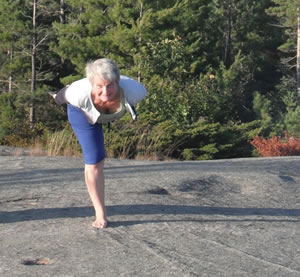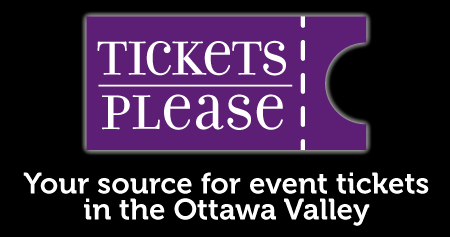June 2014 Speaking Volumes by Ottawa Valley Librarians
To read more articles and reading suggestions by our area's librarians, return to the Speaking Volumes main page.
Pam Harris, CEO/Chief Librarian, Mississippi Mills Public Library

Pam Harris has trouble finding time to read. New in her role as CEO/Chief Librarian at the Mississippi Mills Public Library, Pam has been spending time getting to know her new community, being way too cold, and wondering why it's inevitably bad weather whenever she has to jump in her car and drive far far away.
When not driving or working, Pam can be found trying to figure out how to get the birds to stop flocking to the neighbour's feeder just so she can tease her one sleek cat and her one fat cat into being entertained. Otherwise Pam is practicing yoga, learning not to lock herself out of her new house, trying to draw and wishing the sun would shine so she could go down by the river, dip her toes in and just maybe read a book. She can often be found at the Mississippi Mills Public Library, Almonte or Pakenham Branch. Drop by, she'd love to meet you.
Online Exclusive: Pam's picks for the best books on Home, Community and Belonging at the bottom of this page.
The Fellowship of the Libraries
Welcome to the inaugural Speaking Volumes, a 'think' piece by public librarians in Arnprior, Carleton Place, Lanark Highlands, Mississippi Mills, Perth, Renfrew and Smith Falls. This is about our libraries, our communities, and you! Every month one of us will present an article on library-related topics that link us to each other. We already have a great line-up of topics to look forward to: You mean you get paid to work here? Innovation and community — why we do the things we do (in libraries); Tailoring Collections; Libraries as Cultural Hubs… We’re keen to share our excitement and passion about libraries and community with you. Featured titles and article snippets will be featured online.
A Fellowship of Libraries and Community
Ask any realtor about the frequently asked questions they get from potential home buyers and they’ll tell you that a top question is often along the lines of “how close are we to the nearest public library?” This is true whether the potential buyer is an active library card holder and user or rarely/never visits the library. It turns out that just knowing you have a library in close proximity, whether you go there or not, adds value to your home and makes a community not only more attractive but more stable — libraries are harbingers of community. I’ll go further and suggest that libraries are community writ both small and large.
What are we talking about when we say community? What’s that word mean to you? Generally it means a group sharing common values and social understanding. But it’s deeper and richer than that. It’s a fellowship. It’s a meeting ground of ideas and lifestyle where freedom and security is understood. It’s acceptance and companionship. Community is the anchor to which we tether ourselves because it is where we will find the full expression of who we are both individually and collectively.
Ray Oldenburg, in The Great Good Place (unfortunately not available at any of our public libraries but can be borrowed through interlibrary loan!), wrote about healthy living in three realms: home, work, and community or the “third place” — that place we find social value in gathering together, in social inclusiveness. Examples of the third place (or space) are cafés, malls, internet chat rooms and, of course, libraries! The third place is public space where we meet to talk and read, explore ideas, and experience companionship and belonging. It’s also civic territory where we get to engage in civic or democratic learning, thought and action.
This is how libraries are communities writ small and large. Traditionally, the big principles public libraries rest on are ones of culture, education and learning; but most particularly the principle of free and equitable access. Public libraries provide welcoming, non-discriminatory access to the physical space of the library, and also unfettered intellectual access to all resources within and online. People visiting the library today trust that we will guide them to the right book and help them make the appropriate connections to be successful in their goals — whether they need a great film for the weekend, the skills to write a résumé, or simply a space to sit. The doors of today’s public libraries are wide open, and although the formats are changing along with technology, writers still write and readers still read and the librarian’s role is the joyful one of connection: every book to its reader, every reader to her or his book. And this is deep reading — it’s literacy yes, but also mind-blowing expansion: public libraries, the doorway to freedom! It’s that old adage: open a book, open the world.
I am often asked if e-books and e-readers will take the place of physical books. I don’t have a magic looking glass for the answer, and maybe the real question is whether libraries will still exist in the years ahead. My answer is that, despite changing formats, we’ll still want books, writing, and reading, pursuit of knowledge and creative expression. And yes, I think libraries will still exist. I think so because libraries are the pinnacle of community. Each public library reflects the needs and interests of the community it serves. Each public library also creates and provides community to those who come through its doors. We extend a welcoming hand, and I think you will find that librarians are also defenders — defenders of the democratic principles that enliven and enable community, and defenders of the intellectual rights and freedoms of those we serve, including the freedom of expression and the right to privacy. We defend the right to know and the right to access past historical records, and we preserve what we have now for future generations. Figuring out this role in light of technological housekeeping is difficult, because as more and more of our stuff is housed in the “cloud”, it becomes increasingly ethereal — changing how we think about and value it. But that’s a different article.
All these things — big principles and big ideas, small acts of kindness and ordinary everyday acts — underpin public librarianship. They knit our community a stitch and a strand at a time; weaving in the strands of home, work and place. Solidifying our sense of being, our place in the world. Home.
Pam's Picks: Books on Home, Community and Belonging for children, teens and adults
To pick up any of these titles, check your local library or enquire about inter library loan.
Picture books
- A Place to Call Home by Alexis Deacon, illustrated by Viviane Schwarz
- Stellaluna by Janell Cannon
Young Readers
- Goin' Someplace Special by Patricia C. McKissack, illustrated by Jerry Pinkney
Young Adult Fiction
- Divergent by Veronica Roth
- The Hunger Games by Suzanne Collins
- The Outsiders by S.E. Hinton
- Belonging by Isabel Huggan
Non-fiction
- Bowling Alone, The Collapse and Revival of America Community by Robert Putnam
- The Great Good Place by Ray Oldenburg




